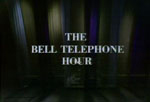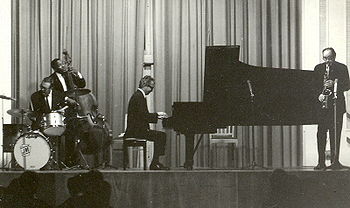From Monthly Film Bulletin, February 1977. — J.R.
U.S.A., 1968
Director: (not credited)
Dist–TCB. p.c–Drew Associates. For the Bell System. p–Robert Drew, Mike Jackson. assoc. p–Harry Moses. p. co-ordinator–Jean Swain. sc–(not credited). ph–Abbot Mills, Juliana Wang, Ralph Weisinger. asst. ph–Bill Hanson. In color. ed–Naomi Mankbwitz. m.d–Donald Voorhees. songs–fragments of “When the Saints Go Marching fn”, “Hello Dolly”, “Rose”, “The Kinda Love Song” by George Weiss, performed by Louis Armstrong; “Con Alma”, “Swing Low, Sweet Cadillac” performed by Dizzy Gillespie; “I’m in a Dancing Mood” performed by Dave Brubeck; “Light in the Wilderness” by Dave Brubeck; “Forest Flower”, performed by Charles Lloyd. sd–Dave Blumgart, Stan Agol. narrator–Don Morrow. with–Louis Armstrotrg, Dave Brubeck, Paul Desmond, Joe Morello, Eugene Wright, Iola Brubeck, Matthew Brubeck, Michael Brubeck, Catherine Brubeck, Christopher Brubeck, David Brubeck, Darius Brubeck, Charles Lloyd, Keith Jarrett, Dizzy Gillespie, James Moody, George Weiss. 1,921 ft. 53 mins. (16 mm.).
Interviews with Louis Armstrong, Dizzy Gillespie, Dave Brubeck and Charles Lloyd, interspersed with snatches of their music in rehearsal or performance.
An appalling example of how appreciation of jazz can be summarily crushed in the process of supposedly trying to promote the music, this American TV documentary follows the fatal course of rarely letting the music speak for itself for more than a few bars at a time, while encouraging each of the four musicians to pontificate at length about his life and art. What emerges from this approach is an irritating see-saw pattern of cross-cutting between fragments of rehearsal or performance (which are rarely permitted to run continuously for the duration of even a single chorus, and are themselves often overrun by the narrator’s unhelpful twaddle) and spoken generalities by Armstrong, Gillespie, Brubeck and Lloyd. There is scarcely any fresh information to be gleaned from the latter, although Armstrong’s description of the death of Joe Oliver, “stranded” in Savannah, and Gillespie’s proposal of a “24-hour day” — with everyone working six-hour shifts, and shops and restaurants kept open round the clock — are both somewhat affecting. Brubeck is glimpsed with the most famous of his quartets at the December 26, 1967, concert in Pittsburgh where he announced its disbanding, with his wife Iola at their home in Connecticut, and at a rehearsal and performance of his oratorio “Light in the Wilderness” at the University of North Carolina, with his entire family attending the latter. It is in keeping with the film’s methods that this ponderous oratorio –which sounds only remotely related to jazz and, judging from these excerpts, is conceivably the least appealing work Brubeck has ever composed — is accorded more time than any other music in the film. (Some of Brubeck’s remarks — apart from his corny, well-meaning comments about the Brotherhood of Man — are marginally amusing, e.g. , “I put the devil in 4/4 time and I put God in 5/4 time”.) Lloyd is presented as a late Sixties flower child, playing his flute beside the pounding surf of the Pacific and discussing his childhood in Memphis; a few excerpts of a Lloyd concert at Reed College follow. The film concludes with an extended rehearsal by Armstrong and a studio band while the narrator periodically moralizes about the fact that it’s a commercial date.…On balance, the most that can be gleaned from this insulting survey is some laconic Armstrong singing and playing, bits of substandard Brubeck, characteristic solos by Gillespie and James Moody (heard on alto sax, but subsequently seen on tenor), and typically derivative playing by Lloyd — all intermixed with illuminating remarks like Lloyd’s climactic revelation: “It’s all there in the music”, Sad to say, the music is scarcely there at all.
JONATHAN ROSENBAUM


